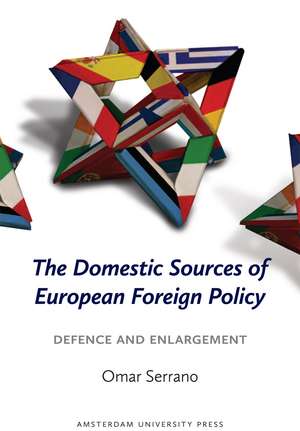The Domestic Sources of European Foreign Policy: Defence and Enlargement
Autor Omar Serranoen Limba Engleză Paperback – 23 iun 2013
When it comes to formulating foreign and pan-European policies, the European Union faces myriad challenges. The Domestic Sources of European Foreign Policy is an incisive study of these difficulties and their origins. It pays particular attention to the ways internal EU debates are influenced by domestic politics and political actors who legitimize or constrain support for shared policies. Ultimately revealing whether a democratic deficit exists in EU foreign policy, this book will be required reading for scholars and policy makers interested in European affairs and international relations.
Preț: 395.40 lei
Preț vechi: 497.91 lei
-21% Nou
Puncte Express: 593
Preț estimativ în valută:
75.68€ • 82.24$ • 63.62£
75.68€ • 82.24$ • 63.62£
Carte indisponibilă temporar
Doresc să fiu notificat când acest titlu va fi disponibil:
Se trimite...
Preluare comenzi: 021 569.72.76
Specificații
ISBN-13: 9789089645104
ISBN-10: 9089645101
Pagini: 200
Ilustrații: black & white tables
Dimensiuni: 152 x 229 x 23 mm
Greutate: 0.3 kg
Editura: Amsterdam University Press
Colecția Amsterdam University Press
ISBN-10: 9089645101
Pagini: 200
Ilustrații: black & white tables
Dimensiuni: 152 x 229 x 23 mm
Greutate: 0.3 kg
Editura: Amsterdam University Press
Colecția Amsterdam University Press
Notă biografică
Omar Serrano is a senior researcher and lecturer at the University of Lucerne in Switzerland.
Cuprins
1 Introduction
2 Theorizing European Foreign Policy
A domestic approach to European foreign policy
The cases
3 Security and Defence Policies
3.1 Origins, evolution, and current state of affairs
Military and civilian operations
State of affairs
The Lisbon Treaty: from ESDP to CSDP
3.2 National priorities and capabilities
France
Germany
United Kingdom
The southern European states and ESDP
New Member States and ESDP
3.3 Statistical analysis
Data sources
Independent variables
Other variables
Model
Results
3.4 Instrumentalizing foreign policy? Government popularity and ESDP in France, Sweden, the Czech Republic, and Romania
4 Enlargement
4.1 Domestic factors and enlargement
4.2 The workings of the enlargement process
4.3 Testing the argument
5 Conclusions
Appendices
1 Enlargement: FSQCA Positive Outcome
2 Enlargement: FSQCA Absence of Outcome
3 Coding of FSQCA Conditions
4 Veto Players
5 ESDP: Operationalization and Measurement
6 ESDP Missions
7 Political Parties: ESDP
8 Political Parties: Enlargement
9 GDP per Capita
10 Unemployment
2 Theorizing European Foreign Policy
A domestic approach to European foreign policy
The cases
3 Security and Defence Policies
3.1 Origins, evolution, and current state of affairs
Military and civilian operations
State of affairs
The Lisbon Treaty: from ESDP to CSDP
3.2 National priorities and capabilities
France
Germany
United Kingdom
The southern European states and ESDP
New Member States and ESDP
3.3 Statistical analysis
Data sources
Independent variables
Other variables
Model
Results
3.4 Instrumentalizing foreign policy? Government popularity and ESDP in France, Sweden, the Czech Republic, and Romania
4 Enlargement
4.1 Domestic factors and enlargement
4.2 The workings of the enlargement process
4.3 Testing the argument
5 Conclusions
Appendices
1 Enlargement: FSQCA Positive Outcome
2 Enlargement: FSQCA Absence of Outcome
3 Coding of FSQCA Conditions
4 Veto Players
5 ESDP: Operationalization and Measurement
6 ESDP Missions
7 Political Parties: ESDP
8 Political Parties: Enlargement
9 GDP per Capita
10 Unemployment
